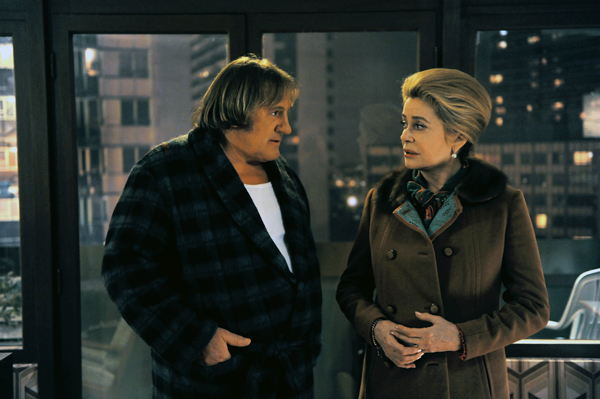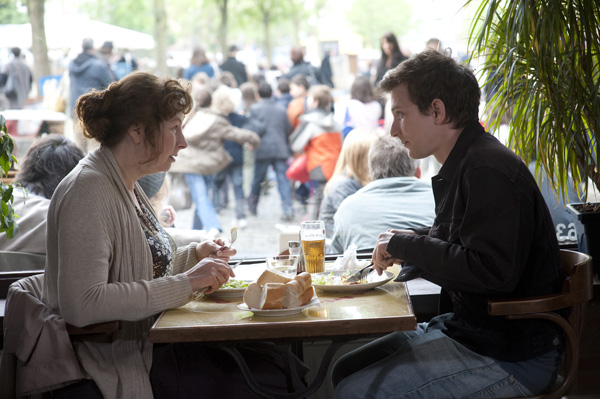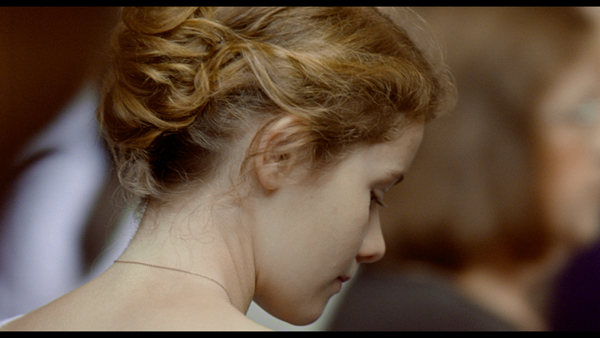|
Reviews of Recent Independent, Foreign, & Documentary Films in Theaters and DVD/Home Video
 Rendez-Vous with French Cinema Have French films gotten better or have programmers become more resistant to the more esoteric, or, shall we say, audience-alienating filmmaking? Compared to previous editions of Rendez-Vous with French Cinema of the recent past, the quota of misfires is mercifully low, even considering the deliberate provocation or two. This year’s edition leans more toward well-written fare, but that’s not to say that it’s necessarily mainstream. Some of the films have narratives that are barely there, and plenty are singular, off-beat enough to stand out in crowd; and yet the filmmakers haven’t forgotten the audience. Even the most eccentric effort has a drive, the need to say something. In the best series opener in years, the sly Potiche is François Ozon’s most successful film to date—it’s consistent in tone from start to finish: playful and adult. An adaptation of a 1970s play, it also offers a tribute to the film comedies of that decade (Cousin, Cousine; Pardon Mon Affaire). Ozon bathes the film in all of the colors and hairstyles of the era, and it’s a perfect vehicle for Catherine Deneuve, starring in a much warmer role than usual. The 67 year old should be the envy of any actress of any nationality and any age. She plays the eternally-optimistic and knowing Suzanne, who’s long married to an umbrella factory owner. She’s dismissed as a trophy wife (hence, the film’s slangy title) by her own daughter, but little fazes her, and that’s saying a lot. Her husband has a wandering eye, there’s labor unrest, and an ex-fling (Gérard Depardieu) resurfaces. It’s An Unmarried Woman and It’s My Turn as a boulevard comedy. Appropriately, it kicks off a series in which lead roles for women overwhelmingly dominate those for their male counterparts.
In one of the many startling debuts, Valérie Donzelli’s The Queen of Hearts proves that you can be both emotional and deadpan at the same time. She’s made perhaps the liveliest slacker film ever. She wrote, produced, did the costumes, wrote the songs, and also stars as Adèle, an impressionable, doe-eyed 30-something (maybe Tina Fey’s distant cousin) drifting from crisis to crisis and slowly taking baby steps toward personal responsibility. Because she wallows in self-pity, you feel a song could break out at any moment. And it does. (She warbles she feels “strangled like a Hitchcock heroine.”) Donzelli tosses in sex scenes—one funny, another erotic—screwball comedy, and substantive scenes of Adèle and her neurotic cousin making a go of it as roommates. The unpredictable tone upturns precocious navel gazing, besides Adèle’s startling lack of introspection. She sees what she wants to see, especially in men. Physically expressive as an actress, Donzelli has the makings of a put-upon silent film heroine, and she must have called in a lot of favors; directors Dominic Moll and Gilles Marchand appear as walk-ons. Another first effort exists in an alternative universe than Adèle’s Paris. Isabelle Czajka’s Living on Love Alone extraordinarily captures the ego bruising, fumbles, and the loopy learning curve of a college graduate fresh on the job market. Julie, 23 (Anaïs Demoustier), works at the swankiest PR agency in the city, but it’s not what she expected. When she’s not ordering lunch, she baby-sits for her boss. After she’s fired, Julie drifts, like Queen’s Adèle, but she at least has some self-perception. The film has a subtle vibrancy because Julie, although at a crossroads, has several options, even if one of them is hooking up with older men or running off to the South with a charming smooth talker. The familiar wrong turns she makes may not make the film as distinctive as it aims to be, but the director has written an unpretentious, straightforward script for a cast up for anything, whether in or out of the sack. Czajka stays away from clichéd New Wave homages, even though her film features a girl and, making a later appearance, a gun.
And it’s not only the obvious physical changes confronting Anna. She’s about to be confirmed, but in the very first scene, the film hints that it’s a boy in the choir that has her full attention during mass. The punkish title, taken from a Serge Gainsbourg song, has more to do with the film’s needy adults and could easily refer to Anna’s ailing bedridden granddad. No matter age or infirmity, some of his needs override others. Upfront in its themes and execution, director Katell Quillévéré’s film convincingly and refreshingly portrays Anna’s experiences as alien, as though only occurring to her and no one else in the world. Four years ago, the festival presented Tell No One, which became one of the most successful French films of the last 10 years. This year’s Rendez-Vous includes the adaptation of prolific American author Douglas Kennedy’s 1995 novel, The Big Picture. A mid-list author here, Kennedy has a huge European following. This film is more lucid, absorbing, and plausible than Tell No One, as long as you don’t scrutinize the plot too thoroughly. (Apparently, it’s not too difficult to obtain a fake French passport.) On paper, hotshot estate lawyer Paul seems to have everything: a beautiful wife and two children in an airy chateau outside of Paris. That he wears his hair a little too long and unruly for a white-glove firm indicates he may have had other dreams. When his disintegrating home life and a resulting crime presents him with a one-in-a-million shot to reinvent himself, he grabs it, but, in a twist, the story squeezes out suspense when his plans succeed too well. (The French title is more apt, “The Man Who Wanted to Live His Life.”) You’re on Paul’s side immediately—he’s married to a wife played by the brittle Marina Foïs, a blast of cold air. And secondly, actor Romain Duris brings a crucial, though often overlooked, ingredient for a man-on-the-run thriller: vulnerability. Because of the focus on French films, of course you expect something sexy with full frontal nudity. Happy Few delivers both while posing the question, is it possible for two couples to swap partners without complications? At first, the rules-free arrangement between the two middle-class, 30-something couples would be the envy of Bob & Carol & Ted & Alice. “Is it normal to feel so good so quickly?” one of them asks. And, “Can you love two people at the same time?” The film replies: not so fast. Jealousy, rules—no sleepovers—and betrayal ensues. In other words, the inevitable happens. You can count the minutes until it gets ugly. Marina Foïs appears here too, laughing even. Claude Lelouch has two films in the program, the documentary From One Film to Another, where he dissects his career, film by film, and his new and 42nd film, What Love May Bring. The plot’s straight out of a Carol Burnett send-up of a 1940s potboiler: part romantic epic, war film, and courtroom drama. All this and Auschwitz, too. The bold sentimentality and Lelouch’s unwavering faith in the triumph of love is a throwback to another time. The bulk of the story takes place during the German occupation of Paris when Ilva, the daughter of a syphilitic porno actress, falls in love with a hot Nazi officer after he saves her beloved stepfather from execution. For an unadulterated history lesson, look elsewhere. Paul Verhoeven’s sexy World War II drama Black Book is a documentary in comparison. Actress Audrey Dana gives it her all. In a beautiful moment, you actually see her fall in love with the German as he plays the “La Marseillaise” on an accordina, much to the puzzlement of his eavesdropping fellow Nazis. Unfortunately, Dana doesn’t always receive the support she needs, particularly from two wooden actors playing American GIs, and a few times the film veers intentionally toward camp. An American wedding reception, with shirtless Indians on horseback wearing feathered headdresses, looks like an outtake from Annie Get Your Gun. Yet not many directors could get away with dialogue such as, “Fate, like a certain postman, always rings twice.” Cynics beware. A hipper, more somber film, Free Hands, takes an equally sanguine look at the inevitability of love, and is based on a true story. The elegant and regal Israeli actress Ronit Elkabetz plays a filmmaker making a quasi-documentary in a prison, using inmates. The film begins with Barbara at a fortune teller, asking about a particular man she’s met. She’s already in love—with a prisoner. Her hard crush explains the extra lift in her step down the jailhouse corridors as she holds her script like a confident schoolgirl. Soon Barbara passes love letters to Michel (Carlo Brandt), breaks more than one rule, and lies to the authorities. The script doesn’t fully answer what drew her to Michel, who’s serving time for robbery. She tells her best friend that it’s the way he looks at her, and from the little we know, she’s on the rebound from a relationship with a junkie. Just when you think the solidly middle-class and successful Barbara might be exploiting Michael, who, let’s face it, has limited options, the film turns the tables. Barbara could be good for Michelle, too. Brigitte Sy, in another feature directorial debut, observes, never insisting that the audience accept or condemn the relationship. Instead of frustration, it produces a peculiar kind of absorption. Compared to many films here, Leila delivers a shock to the system. In this old-fashioned musical set in a very contemporary multicultural Paris, the lovestruck characters take any excuse to sing and dance. The film’s pop score of updated French standards of the ’60s and ’70s delivers more catchy melodies than other recent musicals—that’s not a dubious distinction—and the dancers seem like they’re making it up on the spot in numbers choreographed like one big street party. But the romance between Arab Leila (Leila Bekhti) and white rich kid Gabriel (Benjamin Siksou) doesn’t make a lot of sense—she first meets him when he almost runs over her kid brother with his convertible after playing poker all night. She needs a Prince Charming, and some of the humor doesn’t fly or has expired. Leila’s swishy male friend actually says, “Talk to the hand,” and it’s not set in 1996.
Far from the middlebrow, Benoît Jacquot returns to the series with Deep in the Woods, collaborating once again with actress Isild Le Besco, who has snatched the title of the most feral actress away from Samantha Morton. He knocks her devout, virginal Joséphine off her bourgeois pedestal in this brutally earthy variation of Beauty and the Beast, allegedly based on a true story. She’s a country doctor’s daughter under the sway of a filthy, scrawny, big-eared, bug-eyed beggar. He’s a con man, first pretending to be deaf and dumb, and a magic man, controlling her like a puppet in a possessed state of lethargy. After he rapes her, he then wills her to run away with him into the wilderness. Set in the mountainous terrain of southern France of 1865, the film has some of the most beautiful imagery in the program and the most down and disgusting—walkouts will follow. It’s more of an endurance test for the audience than a mystery of why Joséphine remains with her abductor. Jacquot purposely pushing buttons. Though the film is intermittently hypnotic in it strangeness, the 102-minute running time dissipates whatever spell there is. Of all the
films mentioned above, only the droll Potiche has a U.S.
distributor for now. (It opens here on March 25.) Other selections,
Love Crime, Princess of Montpensier, Mozart’s Sister,
and The Sleeping Beauty, will arrive in theaters later this
year—and all star women. For the movies that might have a life outside of festivals,
my money would be on The Long Falling, The Big Picture, or even Service Entrance to land a U.S.
release. Regardless, it would be a shame to miss an opportunity to see
many of these, especially The Queen of Hearts and
Love Like Poison.
Kent Turner
|




